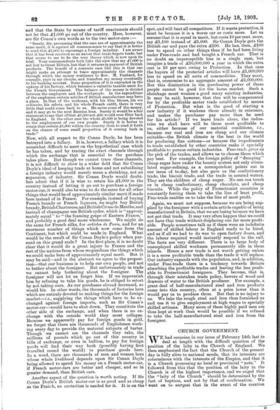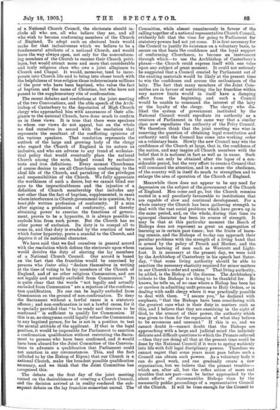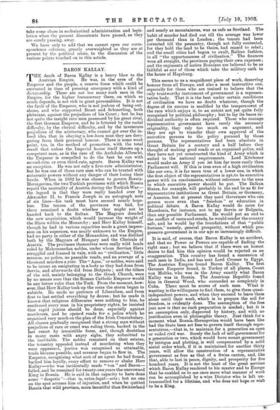CHURCH GOVERNMENT.
WE had occasion in our issue of February 14th last to deal at length with the difficult question of the position of the laity in the Church of England. We then emphasised the fact that the Church of the present day is fully alive to national needs, that its interests are coterminous with the interests of the Empire, and that it is a Church possessing no local or provincial "note." It followed from this that the position of the laity in the Church is of the highest importance, and we urged that the "laity of the Church" should be determined by the fact of baptism, and not by that of confirmation. We went on to susYgest that in the event of the creation of a National Church Council, the electorate should in- clude all who are, all who believe they are, and all who wish to become conforming members of the Church of England. To adopt such an electoral basis would make for that inclusiveness which we believe to be a fundamental attribute of a national Church, and. would leave the way always open, not only for the nonconform- ing members of the Church to resume their Church privi- leges, but would attract more and more that considerable and. truly religious class who owe a, joint allegiance to Church and Chapel. It Would, moreover, tend to incor- porate into Church life and to bring into closer touch with the helpfulness of true religion those indeterminate millions of the poor who have been baptised, who value the fact of baptism and the name of Christian, but who have not passed to the supplementary rite of confirmation.
The recent debates and. resolutions at the joint meeting of the two Convocations, and. the able speech of the Arch- bishop of Canterbury to the deputation of High Church clergy who approached him with assurances of their alle- giance to the national Church, have done much to confirm us in these views. It is true that there were speakers to whom our views do not appeal, but on the whole we find ourselves in accord with the resolution that represents the resultant of the conflicting opinions of the various speakers. That resolution represents the outlook of the large and growing body of the clergy who regard the Church of England in its nature as inclusive, and who are adverse to any trend of ecclesias- tical policy that would eventually place the national Church among the sects, hedged round by exclusive tests and iron definitions. Every earnest Churchman of course desires to see all Churchmen conforming to the ideal life of the Church, and partaking of the privileges and responsibilities of the Church. We fully appreciate the worthiness of such a desire, but we cannot blind our eyes to the impracticableness and the injustice of a definition of Church membership that includes any test other than the fact of baptism, supplemented, in eases where interference in Church government is in question, by a bonci-fide written profession of conformity. If a man after signing a profession of conformity, and thereby obtaining power to exercise the functions of govern- ment, proves to be a hypocrite, it is always possible to exclude him from such power. But the Church has no other power of exclusion. Its duty is to compel all to come in, and that duty is evaded by the erection of tests which foster hypocrisy, prove a scandal to the Church, and deprive it of its national character.
We have said that we find ourselves in general accord with the resolution which defines the electorate upon whom would devolve the duty of electing the lay members of a National Church Council. Our accord. is based on the fact that the franchise would be exercised by persons who (inter alia) "declare themselves in writing at the time of voting to be lay members of the Church of England, and of no other religious Communion, and are not legally and actually excluded from Communion." It is quite clear that the words "not legally and actually excluded from Communion" are a rejection of the confirma- tion qualification. No one can be legally excluded from Communion on the ground of non-confirmation. To deny the Sacrament without a lawful cause is a statutory offence ; and non-confirmation is not a lawful cause, for it is specially provided that "to be ready and desirous to be confirmed" is sufficient to qualify for Communion. If this is so, no clergyman could legally refuse the Communion to any baptised person, for he is not in a position to test the mental attitude of the applicant. If that is the legal position, it would be impossible for Parliament to sanction a confirmation qualification without restricting the Sacra- ment to persons who have been confirmed, and it would have been absurd.for the Joint Committee of the Convoca- tions to advocate a qualification that Parliament could not sanction in any circumstances. This, and the fact (alluded to by the Bishop of Ripon) that our Church is a national Church, make the broadest possible qualification necessary, and. we think that the Joint Committee has iecognised this.
The debate on the first day of the joint meeting turned on the desirableness of creating a Church Council, and the decision arrived at in reality rendered the sub- sequent debate on the lay franchise somewhat unreal. The Committee, while almost unanimously in favour of the calling together of a national representative Church Council, evidently felt that the time for going to Parliament for statutory powers had not yet come. It is first necessary for the Council to justify its existence on a voluntary basis, to secure on that basis the confidence and the loyal support of conforming Churchmen, to become an instrument through which—to use the Archbishop of Canterbury's phrase—the Church could express itself with one voice upon any subject of great moment. It could not seriously be suggested that a Council created by Parliament out of the existing materials would be likely at the present time to win the confidence and arouse the enthusiasm of the laity. The fact that many members of the Joint Com- mittee are in favour of restricting the lay franchise within very narrow limits would in itself have a damping effect from the beginning, and such a. Council would be unable to command the interest of the laity or the loyalty of the clergy. The clergy who dis- liked the system of government instituted by the National Council would repudiate its authority as a creature of Parliament in the same way that a similar class now repudiates the authority of the Privy Council. We therefore think that the joint meeting was wise in reserving the question of obtaining legal constitution and authority until the Council has come into working order on a voluntary basis. Slowly the new Council may win the confidence of the Church at large, that is, the confidence of the nation, and may inspire all Church members with the belief that it is national in fact as well as in name. Such a result can only be obtained after the lapse of a con- siderable period, but the very effort to create a Council that will command the attention, and in a sense the obedience, of the country will in itself do much to strengthen and to enlarge the area of operation of the Church of England.
Meanwhile there does not appear to be any need for depression on the subject of the government of the Church of England. Men come and go, but the Church remains rooted. in a soil peculiarly favourable to institutions that are capable of slow and continual development. For a whole century the Church has been gathering strength to deal with the vast social problems which have grown up in the same period, and, on the whole, during that time its episcopal character has been its source of strength. It may be that at this particular moment the Bench of Bishops does not represent as great an aggregation of learning as in certain past times ; but the fruits of learn- ing remain, and the Bishops of to-day can approach their peculiar problems with the strength of a living hand that is armed by the policy of Pecock and Hooker, and the various learning of men such as Westcott and Light- foot. It is necessary at the present day, we were told by the Archbishop of Canterbury in his speech last Satur- day, "that some living authority should be able to sanction the necessary elasticity required for minor matters in our Church's order and system. That living authority, he added, is the Bishop of the diocese. The Archbishop's tribute to the Bishops is a thing to be thankful for. He knows, he tells us, of no case where a Bishop has been lax or careless in admitting unfit persons to Holy Orders, or in dealing with unfit clergy where it was practically possible to deal with them. "I assure you," he declared with emphasis, "that the Bishops have been considering with the greatest care what is their duty in matters such as this, and I believe that they are exercising in the sight of God, to the utmost of their power, the authority which was given to them for the repression of what they believe to be erroneous and unsound." If this is so, and we cannot doubt it—cannot doubt that the Bishops are approaching with a, large and judicial mind the infinitely delicate and difficult questions to which the Primate referred —then they are doing all that at the present time could. be done by the National Council if it were to spring suddenly into life with full legal disciplinary powers. Therefore we cannot regret that some years must pass before such a Council can obtain such powers. As a voluntary body it can do good work, and can gradually create a new organisation, but we believe that the present troubles— which are, after all, but the reflex action of more real troubles that are past—can be better approached by the silent efforts of statesmanlike Bishops than by the necessarily public proceedings of a representative Council of the Church. It will be time enough for the Council to take some share in ecclesiastical administration and legis- lation when the present discontents have passed, as they are surely passing, away.
We have only to add that we cannot open our corre- spondence columns, greatly overweighted as they are at present by the political crisis, to the discussion of the various points touched on in this article.












































 Previous page
Previous page